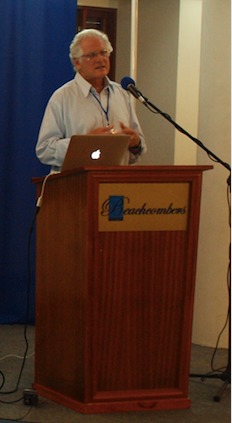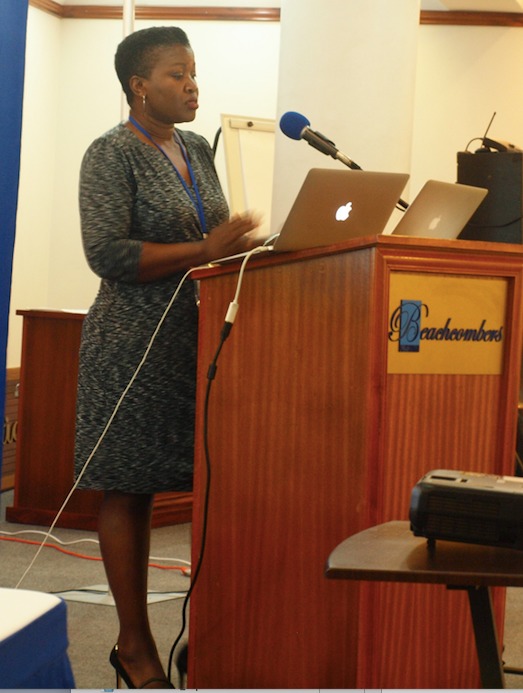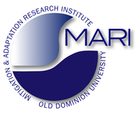Implementing and Monitoring the Sustainable Development Goals in the Caribbean: The Role of the Ocean
Session 2: Interdependencies and interactions of SDGs, Targets and Indicators in Caribbean Small Island States
Co-Chairs: Danielle Evanson, Dr. Hans-Peter Plag
This session addressed the wicked problem presented by SDGs to society and focus on the interconnected nature of the SDGs. Key characteristics are the potentially large economic burden associated with progress towards the Targets, as well as the challenge that those attempting to solve the problem are to some extent causing the problem. In a transdisciplinary dialogue, the role of the ocean for the interconnected SDGs was characterized taking into account the many interdependencies between the SDGs. The session considered that most of the SDGs address the socio-economic and environmental systems based on land, and that both the human and non-human environment in SIDS is crucially dependent on the surrounding ocean. While this dependency is grossly similar it is discretely different in the different SIDS, and both the similarities and differences were elaborated on. The goal was to identify those applications and tools that are used in generating knowledge addressing the interdependencies across boundaries between SDGs, government departments and societal sectors.
Presentations
The session started with two presentations, the interdependencies of SDGs were discussed and a framework for the implementation of SDG 14 was presented. The next presentation provided local examples of issues that hamper preservation efforts. In the subsequent panel discussion, the panelist addressed different aspects of SDG implementation from the viewpoints of trade, GEO initiatives, international science organizations and regional NGOs. The participants then split up for a table discussion round.
In the first presentation, Dr Julian Roberts underlined the importance of the interactions between SDGs and identified the risk of perpetuating silos for the SDGs if these interactions are not accounted for. He also saw a risk of focusing on oceans only under SDG 14. Using the example of unsustainable fishing and pointed out that fish that are not seen as prize fish are wasted. This causes an increase in processed imported food with considerable side effects. He asked the question of how the ocean impacts all of the SDGS. He saw challenges in the small size of the SIDS and their economies with the costs of public services being is very high per capita. This results in large challenges for socio-economic planning amplified by the low GDP across the region. He also discussed a number of key challenges including plastic marine debris, impacts of tourism, shoreline protection due to coral reef degradation, and the cumulative loss of mangroves. Sudden shocks due, for example, to hurricane and coral bleaching amplify these challenges. The long-term trends in, for example, ocean acidification and distribution of fish species due to changes in sea-surface temperature will adversely affect the tropical belt. These trends can lead to discontinuities. Alan Edwards gave an overview of the support provided by the Commonwealth Marine Economies Programme (CME). The U.K. hydrographic office provides relevant data for region, and the National Oceanographic Centre provides information for value added products. Many of the CMS outcomes are relevant for SDG 14 indicators.
Dr Robin Mahon gave an overview of the report on “Implementing the Ocean Sustainable Development Goal in the Wider Caribbean: state of play and possible ways forward” co-authored by Lucia Fanning and Robin Mahon. This report focuses on the role of regional ocean governance for the SDG 14 implementation and is the result of literature reviews, phone interviews and surveys. A total of more than 26 regional organizations were found to be relevant for SDG 14 implementation in the wider Caribbean. He emphasized the need for regional coordination of the translation of previous activities under the new framework of SDG 14. He saw major challenges to overcome in the implementation of SDG 14 in the wider Caribbean and opportunities to overcome them through a harmonized approach. He concluded that the engagement in CLME+ Strategic Action Plan SAP implementation offers a considerable potential for integration of ocean affairs, nationally and into regional sustainable development policy.
In the subsequent discussion, it was pointed out that national focal points of the Global Environment Facility (GEF) have been endorsed but national officials have not nominated the SAP as a priority. It would be important to identify who at the national level is making the decisions. At regional level, coordination has been struggling for developing national intersectoral committees.
Louise Mitchell, Saint Vincent and the Grenadines Preservation Fund, reported on a number of unsustainable practices. The government mines sand from beaches and sells it to the public, a practice that leads to coastal erosion. Erosion mapping is required to document the impacts. The burning of tires for disposal leads to pollution and reduced air quality. In farming, chemicals that are banned in other regions (such as round-up) are often used, leading to severe impacts on ecosystems and other resources. Dumping of waste in rivers and the ocean adds to the pollution. Whale and cetacean hunting is also seen as having a negative impact on marine ecosystems. She then reported a few success stories, among them bans on turtles, cetaceans, and the use of Styrofoam. She concluded by pointing out that for national ocean policies there is often a disconnect between the written policies and what actually happens.
 Dr Robin Mahon summarized the findings of a recent study paper on “Implementing the Ocean Sustainable Development Goal in the Wider Caribbean: state of play and possible ways forward”. |
 Louise Mitchell contributed a view on the SDGs in the Caribbean from a preservation point of view and reported unsustainable practices as well as success stories. |
|
The panel in Session 2 focused on the role of the ocean for the SDGs on responsible consumption and production and health. The panelists were (from right) Chad Blackman (Trade International, standing), Rose Alabaster (GEOGLOWS), Sade Deane (CYEN), and Dr Shona Paterson (Future Earth Coasts). The panel was moderated by Danielle Evanson (UNDP), and Dr Hans-Peter Plag (ODU, not in the picture). |
 Rose Alabaster emphasized the role of human rights for the discussion of SDGs and focused on SDG 6. |
Panel Discussion
The panel in Session 2 addressed the role of the ocean for the SDGs on responsible consumption and production in thriving and healthy communities. The panelists were Chad Blackman (Trade International), Rose Alabaster (GEOGLOWS), Sade Deane (CYEN), and Dr Shona Paterson (Future Earth Coasts). The panel was moderated by Danielle Evanson (UNDP), and Dr Hans-Peter Plag (ODU).
In his opening statement, Mr. Chad Blackman focused on food security and the impact of outside fishing in the region. CARICOM provides licences for outside companies, and that is a challenge for the local fisheries.
Ms Rose Alabaster introduce the GEO initiative GEOGLOWS, which has the mission “to connect the demand for sound and timely environmental information to the supply of data, information and knowledge about the Earth’s water system and to explore the science needed to achieve the goals”. Referring to the oceans being a global commons, she underlined that it is a shared resource but in practice doesn't have an equal and collective responsibility. She emphasized that water is intrinsically connected to basic human rights and there is an obligation to all sectors of society to respect, protect and fulfil these rights. For SDG6, she discussed a wastewater monitoring ladder that could be used to assess the state of monitoring in the geospace. The ladder, which allows to start modestly, helps to protect water resources and allows the application of a "polluter-pays" principle. She concluded by emphasizing that speed is needed if SDG6 is to be reached.
Ms Sade Deane commented on the health impacts of microplastics that are increasingly contained in food. The economic impact of marine debris is increasing and a basis to make a case for a reduction of plastics in all processes on land. She recommended that an environment be created that supports proper disposal of the waste and particularly plastics.
Dr Shona Paterson gave a brief overview of the approach Future Earth Coasts is taking. Future Earth Coasts works in the context of international and intergovernmental agreements such as the 2030 Agenda, the UN World Conference on Disaster Risk Reduction, and the Paris 2015 agreement to address a list of challenges that impact the coastal area, including among others equity, justice, resilience, economic opportunities, infrastructure development, ecological management. She also mentioned the Ocean Acidification Africa network as an example of efforts linking observations and information to societal actors.
The subsequent open discussion touched upon the impacts of damaging trades (e.g., dried seahorses) and unsustainably fishing practices. It was emphasized that a shift in social behavior is needed. There is also a needed for economic and political accountability. Tracking of marine debris and identification where the debris and pollution are originating should be a goal.
Table Discussion Round 1
The first table discussion round focused on the contribution of various stakeholders to the SDG implementation. For each table topic and topical area, the participants were asked to consider the following questions:
- What are the major sustainability challenges in your country or area/region, and which of those relate to the ocean?
- Which of the SDGs are of highest priority in your country or area/region, and in which way are these linked to ocean?
- Are there specific entities in your country or area/region that are responsible for the implementation of the 2030 Agenda and the SDGs?
- To what extent is your country or group engaged in monitoring and reporting the SDGs and which entities are responsible for the monitoring?
- How are you communicating the SDGs to the general public and ensuring that they are received in a positive manner to gain community support?
- What are the challenges in implementing SDGs in a coordinated manner and how are interdependencies between the SDGs addressed?
- What information is needed by your country or group to develop, amend, and implement policies and action plans for the SDGs and to monitor and report on the SDGs?
- What ocean-related national, regional and international policies and agreements is your country or group participating in?
The participants grouped into five tables with the topics:
- Science Support for SIS Governments
- NGO and Private Sector Contributions to SDG Implementation
- Fisheries, Food Security, and Life Under Water: SDGs 2 Versus SDG 14
- Blue Growth and Poverty: SDG 1 versus SDG 14
- Education for Sustainability, Justice, and Equality.
Table 1: Science Support for SIS Governments
Moderation and Reporting: Clare Morrall, Robin Mahon.
Table 2: NGO and Private Sector Contributions to SDG Implementation
Moderation and Reporting: James Lord, Kate Charles. Group Participants: James Lord, Kate Charles, Louise Mitchell, Raven Hoflund, Sade Deane and Danielle Evanson
Question 1: What are the major sustainability challenges in your country or area/region, and which of those relate to the ocean?
- Sand mining activities illegal/legal
- Harvesting of endangered species illegal/legal
- No recycling facilities
- No waste management
- Need for partnerships to strengthen capacity
- Finance for NGOs and CBOs that is ongoing and secure to allow sustainable data collection
Question 2: Which of the SDGs are of highest priority in your country or area/region, and in which way are these linked to ocean?
- SDG4 education
- SGD1 poverty
- SDG8 employment opportunities
- SDG2 end hunger
Linked to the ocean as many communities rely heavily on the ocean to provide food and an income
Question 3: Are there specific entities in your country or area/region that are responsible for the implementation of the 2030 Agenda and the SDGs?
Many NGOs are starting to implement or include SDGs in their projects and have assumed responsible but there is a need for government ministries to take responsible and provide guidance to allow NGOs to be in line with government policies.
Table 3: Fisheries, Food Security, and Life Under Water: SDGs 2 Versus SDG 14
Moderation and Reporting: Milton Haughton, Zahidah Afrin Nisa
Question 1: What are the major sustainability challenges in your country or area/region, and which of those relate to the ocean?
- Health of the oceans and marine ecosystems that are being degraded, developmental activities such as oil and gas impacting natural resources
- Overfishing
- Climate issues and acidification & coral reef bleaching
- Institutional capacity and lack of data — Example: Trinidad oil company looking for fishers
- Monetary value of fishing industry does not estimated well and likely under valued
- Lack of understanding of the natural environment and how development impacts
- Belize banning of oil drilling and exploration
- Participation and access to information
- Gender considerations
- Enforcement is a challenge, legislators are slack, educational and awareness is important
- Monitoring, control and enforcement
- Stronger governance is needed
- NGOs come in with out information about cultures, existing regulations, existing state of the populations
- Communications, types of language, "ban"
- Uncoordinated development, entire ramifications
- Challenge-sometime development is approved, need adequate
Question 3: Are there specific entities in your country or area/region that are responsible for the implementation of the 2030 Agenda and the SDGs?
CRFM, OECS, Carricom, UK government joing conservation committee. All agencies know what their responsibilities are, in principle, there should be a point person but there isn't necessarily a point person or committee in every country.
Question 4: To what extent is your country or group engaged in monitoring and reporting the SDGs and which entities are responsible for the monitoring?
There is engagement and interest, but there is a need for institutional coordination. There needs to be mapping at the country level on who they should be coordinating with. Mapping of who is doing what.
Question 5: How are you communicating the SDGs to the general public and ensuring that they are received in a positive manner to gain community support?
Belize had a consultation and what it means for the countries. Important thing is translating it for the man on the street, more is needed in that area. How to get people to relate in their own planning and activity. How and why change and recognize things that they are already doing for best practices.
Question 7: What information is needed by your country or group to develop, amend, and implement policies and action plans for the SDGs and to monitor and report on the SDGs?
- Fisheries landings, fish stocks, water quality, need broader oceanographic data, biological, physical data, information on the states
- Are interventions helping?
- Ecosystem based management data
- Socioeconomic data, fisheries landings, etc. - data may be existing but it's not locally available
- Mandatory data sharing and access for parachutes
- Time series - oceanographic data
- Monitoring changes in climate and ongoing changes in climate related activities
- Ocean acidification, there needs to be increased work on this, how this will impact fish stocks and corals
- Need a proper system and capacity building - one way this could be improved is to work with and through existing institutions
- Projects need to be embedded in institutions
Question 8: What ocean-related national, regional and international policies and agreements is your country or group participating in?
- Several policies in place, there are more that are needed, strengthened, additional fines, revising and updating them
- Eastern Carribean ocean governance policy
- Common fisheries policy
- Castries Declaration on IUU fishing
- St Georges policy on spiny lobster
- CCCCC has a strategy for climate change, fisheries has a plan for climate change.
Table 4: Blue Growth and Poverty: SDG 1 versus SDG 14
Moderation and Reporting: Dr. Julian Roberts, Celeste Jules
Poverty levels in Caribbean countries vary significantly. But few, if any, lie below the $1.25 limit in Target 1.1. So we focused on vulnerability and inequality. Group 4 included Representatives from from SVG, A&B and T&T. Very different levels of employment 15-20%, 11% and 5% respectively. Therefore can't compare like for like and each country has different national priorities.
SVG has identified the need to reduce indigent poverty in coastal communities who suffer greater levels of poverty than inland communities, who rely on agriculture, which is more productive. Fishing is the mainstay for coastal communities in St Vincent while fishing and tourism support the Grenadines.
Group 4 concluded that coastal communities are more vulnerable to the impacts of climate change due to proximity to the coast. By contrast, these communities have an “in built resilience” that makes them stronger. This makes the linkage between SDG14, in terms of protecting and restoring coastal habitats, and SDG 1, in terms of vulnerability of communities to the impacts of climate change, particularly with respect to storm events, particularly relevant. Given recent events in the region, is this in the minds of decision makers?
Group 4 recognised the potential contribution that fisheries can make to poverty reduction, improving livelihoods etc. More sustainable fisheries can support better livelihoods. However, we need to recognise that simply improving fisheries isn't going to benefit everyone. Hard decisions and trade-offs need to be made to improve fishery sustainability and this will disadvantage some, at least in the short term. You need to understand that short-term pain will be needed to achieve long-term gain.
RECOMMENDATIONS
- Countries must recognise the clear linkage between poverty and declines in the health of oceans.
- Countries need to recognise the specific vulnerability of coastal communities to declines in ocean health and the impacts of climate change. Strategies to address these vulnerabilities should be part of the overall strategy to address poverty.
Table 5: Education for Sustainability, Justice and Equity
Moderation and Reporting: Stina Herberg, Shelley Jules-Plag
Climate compliance is missing from the education curriculum. There needs to be a shift in society from the teaching of only discipline related curriculum to a greater trans-disciplinary approach. Currently we are teaching for a discipline and not for solving problems in the world.
The laws that support sustainability are given a low priority. There is the continued observance of ‘manifest destiny’ where human animals grow in conflict with the rest of the world resources.
SDG 1 — No poverty was considered the most important. Also SDG 4 — Quality Education was also considered a priority.
There are a number of organizations in each country that are part of the development process of achieving the SDGs. The place where there seems to be issues is a need for greater cooperation between the ministries so that each understands what the other is doing. Coordination is an issue. There is a need for an overall reporting agency. There is mainly sector planning and issues are not implemented jointly. There is a need to communicate and find ways for the SDGs to have resonance with the broader community.
Data is being collected in various disciplines but the SDGs are really requiring in many cases a different type of data collection. There needs to be a new infrastructure for data collection to incorporate the linkages between goals.
A challenge is that there are levels of the SDG governance. There are legally binding and voluntary groups. There are regional, national, international and sub-regional groups.
This workshop was sponsored by:
 under grant 80NSSC17K0241 |
 |
 |
 |
 |